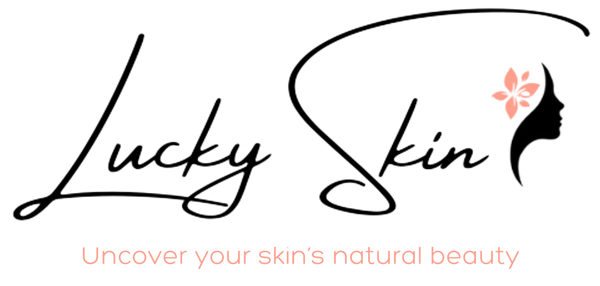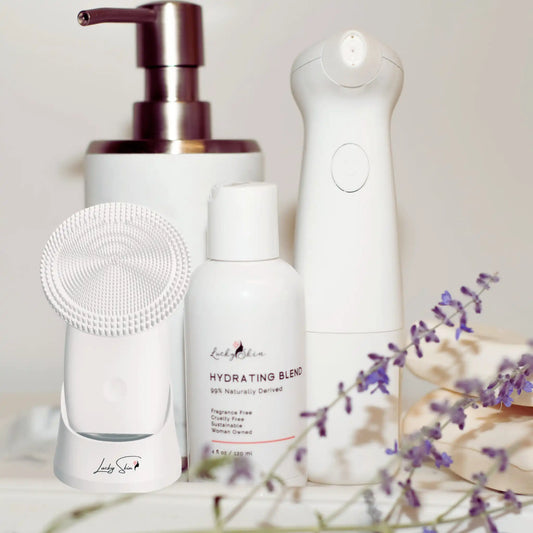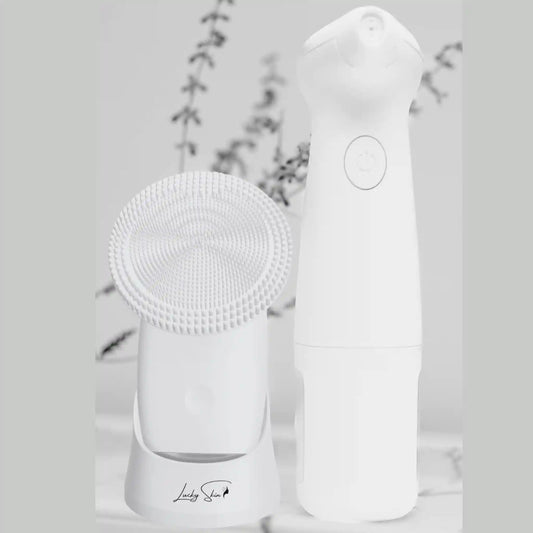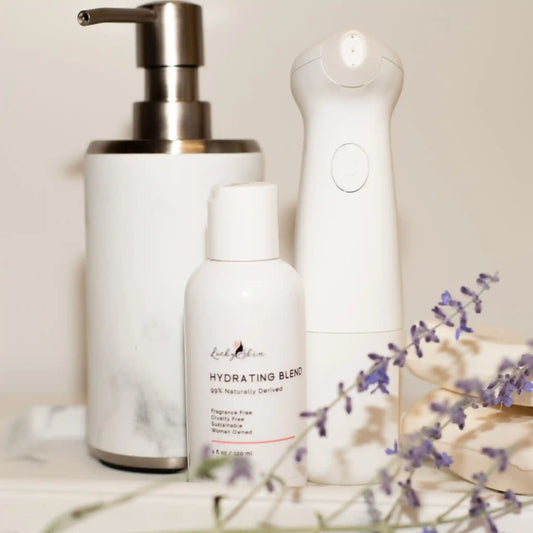Best skin care routine for someone with acne
Share
The Ultimate Guide to the Best Skin Care Routine for someone with acne
Understanding Acne and Its Causes
Acne, a common skin condition that affects millions of people worldwide, can be a source of frustration and self-consciousness for many individuals. Understanding the underlying causes of acne is crucial in order to effectively manage and treat this skin condition. In this blog post, we will delve into the factors that contribute to acne development and explore the best skin care routine for clearer, healthier skin.
What is Acne?
Acne is a skin condition that occurs when hair follicles become clogged with oil and dead skin cells. This can lead to the formation of whiteheads, blackheads, pimples, and cysts on the skin. Acne most commonly affects the face, neck, chest, and back, where oil glands are more prevalent.
Causes of Acne
1. Hormonal Imbalance:
Hormonal fluctuations, such as those that occur during puberty, menstruation, pregnancy, and menopause, can trigger the overproduction of oil in the skin, leading to acne breakouts.
2. Genetics:
A family history of acne can increase the likelihood of developing the condition. Genetic factors can influence the size and activity of oil glands, as well as the skin's response to inflammation.
3. Diet:
Consuming a diet high in refined sugars, dairy products, and fast food can exacerbate acne by increasing inflammation and oil production in the skin.
4. Stress:
Stress can stimulate the production of hormones like cortisol, which can contribute to acne flare-ups. Additionally, stress can weaken the immune system, making it harder for the body to fight off acne-causing bacteria.
5. Skincare Products:
Using harsh or pore-clogging skincare products can irritate the skin and worsen acne. It's important to choose non-comedogenic products that won't clog pores.
Cystic acne is the most severe form of acne, characterized by large, painful cysts deep within the skin. This type of acne is often difficult to treat with over-the-counter products and may require prescription medications such as isotretinoin (Accutane) to achieve significant improvement.
Building a Skincare Routine for Acne-Prone Skin
Cleansing: The Foundation of Your Routine
Cleansing is the first and most crucial step in any skincare routine, especially for those with acne-prone skin. Opt for a gentle, non-comedogenic cleanser that will effectively remove dirt, oil, and impurities without stripping your skin of its natural oils. Look for ingredients like salicylic acid or benzoyl peroxide to help unclog pores and prevent breakouts.
Treating Acne: Targeted Solutions for Different Types of Acne
When it comes to treating acne, it's important to identify the specific type of acne you are dealing with. Whether you have whiteheads, blackheads, cystic acne, or hormonal acne, there are targeted solutions available to help address your concerns. Consider incorporating spot treatments, serums, or creams containing ingredients like retinol, niacinamide, or sulfur to combat acne-causing bacteria and reduce inflammation.
Hydrating and Moisturizing: Balancing Skin's Needs
Contrary to popular belief, even oily and acne-prone skin types require hydration and moisture to maintain a healthy skin barrier. Opt for lightweight, oil-free moisturizers that will provide essential hydration without clogging pores. Ingredients like hyaluronic acid, glycerin, and ceramides can help balance your skin's moisture levels and prevent dryness without exacerbating acne.
Sun Protection: Essential for Acne-Prone Skin
One of the most overlooked steps in a skincare routine for acne-prone skin is sun protection. Exposure to UV rays can worsen acne scarring, hyperpigmentation, and inflammation, making it crucial to incorporate a broad-spectrum or mineral sunscreen into your everyday skincare routine.
Skincare Ingredients to Look For and Avoid while building the best skin care routine for someone with acne:
Ingredients to Look For:
1. Salicylic Acid
- Benefits: Salicylic acid is a beta hydroxy acid that exfoliates the skin, unclogs pores, and helps to reduce acne.
- How to Use: Look for products with a concentration of 2% salicylic acid for best results.
2. Benzoyl Peroxide
- Benefits: Benzoyl peroxide is an antibacterial agent that helps to kill acne-causing bacteria and reduce inflammation.
- How to Use: Start with a lower concentration (2.5% to 5%) to avoid dryness and irritation.
3. Niacinamide
- Benefits: Niacinamide helps to regulate oil production, reduce redness, and improve the skin's barrier function.
- How to Use: Incorporate niacinamide into your routine in the form of a serum or moisturizer.
4. Hyaluronic Acid
- Benefits: Hyaluronic acid hydrates the skin without clogging pores and helps to maintain a healthy skin barrier.
- How to Use: Look for lightweight moisturizers or serums containing hyaluronic acid to keep your skin hydrated.
5. Retinoids
- Benefits: Retinoids help to increase cell turnover, unclog pores, and improve overall skin texture.
- How to Use: Start with a low concentration of retinoids and gradually increase usage to avoid irritation.
Harsh Ingredients to Avoid
1. Fragrance
Fragrances are a common culprit in skincare products that can irritate and worsen acne-prone skin. Synthetic fragrances, in particular, can cause inflammation and allergic reactions, leading to breakouts. Opt for fragrance-free products to steer clear of this potential trigger.
2. Alcohol
Alcohol is often used in skincare products for its astringent properties. However, it can strip the skin of its natural oils, leading to dryness and irritation. This can disrupt the skin's barrier function, making it more susceptible to breakouts. Look for alcohol-free alternatives to maintain a healthy balance in your skin.
3. Sulfates
Sulfates are commonly found in cleansers and can be harsh on the skin, especially for those with acne. They can strip the skin of its natural oils and disrupt its pH balance, leading to inflammation and breakouts. Opt for sulfate-free cleansers to cleanse your skin gently without causing further irritation.
4. Mineral Oil
Mineral oil is a common ingredient in skincare products, but it can be comedogenic, meaning it can clog pores and lead to breakouts. If you have acne-prone skin, it's best to avoid products containing mineral oil and opt for non-comedogenic oils like jojoba or argan oil instead.
5. Silicones
Silicones are often used in skincare products to create a smooth, silky texture. However, they can also trap dirt, bacteria, and sweat in the pores, leading to breakouts.
The Journey to Clear, Healthy Skin
Are you tired of dealing with stubborn acne breakouts? Have you tried countless products and treatments trying to discover the best skin care routine for someone with acne with little to no success? If so, you're not alone. Acne is a common skin condition that affects millions of people worldwide. But fear not, there is hope! With the right skin care routine tailored to your specific needs, you can effectively manage and even reduce acne breakouts. Perseverance and patience are key in achieving clear, healthy skin. Remember, everyone's skin is unique, and what works for one person may not necessarily work for another. Keep exploring different products, treatments, and lifestyle changes until you find what works best for your skin. Don't lose hope – brighter, healthier skin could be just around the corner.




